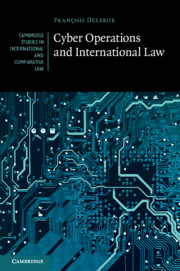Book contents
- Cyber Operations and International Law
- Cambridge Studies in International and Comparative Law: 146
- Cyber Operations and International Law
- Copyright page
- Contents
- Abbreviations
- 1 Does International Law Matter in Cyberspace?
- Part I Attribution
- Part II The Lawfulness of Cyber Operations
- Part III Remedies against State-Sponsored Cyber Operations
- 9 State Responsibility and the Consequences of an Internationally Wrongful Cyber Operation
- 10 Measures of Self-Help against State-Sponsored Cyber Operations
- Part III – Conclusion
- 11 Conclusion
- Appendix Table Assessing the Lawfulness of Cyber Operations and Potential Responses
- Select Bibliography
- Index
- Cambridge Studies in International and Comparative Law
Part III – Conclusion
from Part III - Remedies against State-Sponsored Cyber Operations
Published online by Cambridge University Press: 28 February 2020
- Cyber Operations and International Law
- Cambridge Studies in International and Comparative Law: 146
- Cyber Operations and International Law
- Copyright page
- Contents
- Abbreviations
- 1 Does International Law Matter in Cyberspace?
- Part I Attribution
- Part II The Lawfulness of Cyber Operations
- Part III Remedies against State-Sponsored Cyber Operations
- 9 State Responsibility and the Consequences of an Internationally Wrongful Cyber Operation
- 10 Measures of Self-Help against State-Sponsored Cyber Operations
- Part III – Conclusion
- 11 Conclusion
- Appendix Table Assessing the Lawfulness of Cyber Operations and Potential Responses
- Select Bibliography
- Index
- Cambridge Studies in International and Comparative Law
Summary
Part III examined the remedies available, against the responsible State, to the State victim of a cyber operation. This Part is based on the findings of the two previous Parts. Its first chapter (Chapter 9) showed that the victim State of a cyber operation is entitled to invoke the responsibility of the perpetrating State if two cumulative criteria are met: the cyber operation constitutes an internationally unlawful conduct (Part II) and it is attributable to the perpetrating State (Part I). In such circumstances, the victim State is entitled to invoke the responsibility of the perpetrating State and to obtain full reparation for the damage caused. The reparation is more likely to take the form of compensation and satisfaction than restitutio in integrum. The second chapter of this Part (Chapter 10) examined the measures of self-help that may be used by the victim State to compel the responsible State to comply with its obligations under the law of State responsibility. This chapter demonstrated that countermeasures should be considered to be the main remedy against state-sponsored cyber operations.
- Type
- Chapter
- Information
- Cyber Operations and International Law , pp. 491 - 492Publisher: Cambridge University PressPrint publication year: 2020

